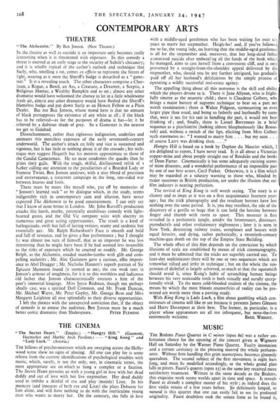THE CINEMA
" The Secret Heart." (Empire.) —" Hungry Hill." (Gaumont,
Haymarket and Marble Arch Pavilion.) " King Kong " and "Lady Luck." (Astoria.) THE billows of psycho-neuroses which are sweeping across the Holly- wood scene show no signs of abating. All one can play for is some release from the current identifications of psychological troubles with music, which, surely, is not the only, nor, in cinematic terms, the most appropriate are on which to hang a complex or a fixation. The Secret Heart presents us with a young girl in love with her dead daddy and out of love with her live stepmother. Her dead daddy used to imbibe a skinful of rye and play (mainly) Liszt. In his memory (and innocent of both rye and Liszt) she plays Debussy for Lim alone, and will have nothing to do with the inarticulate young man who wants to marry her. On the contrary, she falls in love
with a middle-aged gentleman who has been waiting for over ten years to marry her stepmother. Heigh-ho! and, if you've followed me so far, the young lady, on learning that the middle-aged gentleman is all for the stepmother and, moreover, that her long-dead father committed suicide after embezzling all the funds of the bank which he managed, aims to cast herself from' a convenient cliff, and is only prevented by a straight-from-the-shoulder appeal delivered by the stepmother, who, should you be any further intrigued, has gradually 'paid off all her husband's defalcations by the simple process of operating a wildly successful real-estate agency.
The appalling thing about all this nonsense is the skill and ability which the players devote to it. There is June Allyson, who is fright- fully sincere as the neurotic child ; there is Claudette Colbert, who brings a major battery of supreme technique to bear on a part not worth examination ;' there is Walter Pidgeon, surmounting an even larger pipe than usual, and being so fatherly and husbandly by turns that, were it not for his tact in handling the part, it would not bear thinking of ; and, 'finally; there is Lionel Barrymore in a brief sequence as a p.sychiatrist (looking almost blasphemously like Roose- velt) and, without a twitch of the lips, eliciting from Miss Colbert such statements as : " I wanted to marry him . . . but my aunt . . of course Larry was drinking then. . . ."
Hungry Hill is based on a book by Daphne du Maurier which, I am delighted to report, I have never read. It is all about a Victorian copper-mine and about people straight out of Roedean and the books of Dean Farrar. Cinematically it has some adequately exciting scenes of mine disasters, and a wonderful performance of an impossible part by one of our best actors, Cecil Parker. Otherwise, it is a film which may be regarded as a salutary warning to those who, blinded by major successes in British production, are under the illusion that our film industry is nearing perfection.
The revival of King Kong is well worth seeing. The story is as clumsy and as inept as it was on a first acquaintance fourteen years ago ; but the trick photography and the resultant horrors have lost nothing over the same period. It is, you may recollect, the tale of the discovery of a gorilla so huge that it can hold the heroine between finger and thumb with room to spare. This monster is first revealed in a prehistoric jungle, amidst the brontosaurs, dinosaurs, pterodactyls and other evolutionary nightmares ; later it is seen in New York, destroying railway trains, aeroplanes and houses with equal ferocity, and dying, rather pathetically, a twentieth-century machine-gun death on the top of the Empire State Building.
The whole effect of this film depends on the conviction by which illusions of scale are established by means of trick cinematography, and it must be admitted that the tricks are superbly carried out. To later-day sophisticates there will be one or two sequences which are somewhat stilted and jerky in technique ; but on the whole the sus- pension of disbelief is largely achieved, so much so that the squeamish should avoid it, since Kong's habit of scrunching human beings between his very noticeable teeth is both visually and aurally excep- tionally vivid. To the more cold-blooded student of the cinema, the means by which the most blatant counterfeits of reality can be pre- sented are worth more than a passing study.
With King Kong is Lady Luck, a film about gambling which con- noisseurs of cinema will like to see because it presents James Gleason and Harry Davenport at their best. The former, in particular, is a player whose appearances are all too infrequent, but none-the-less


































 Previous page
Previous page